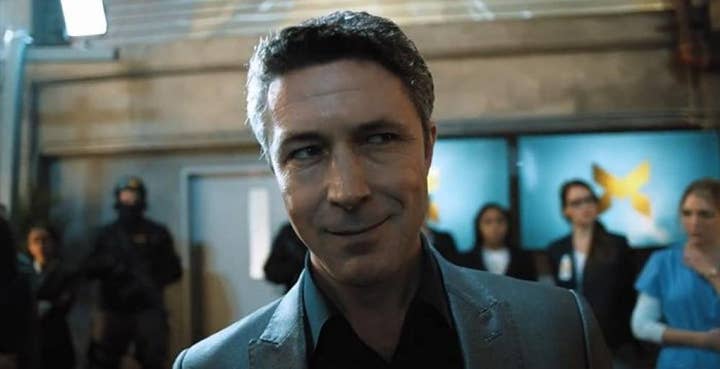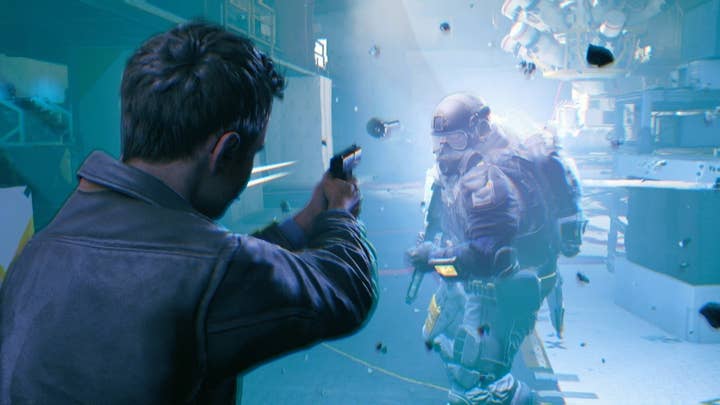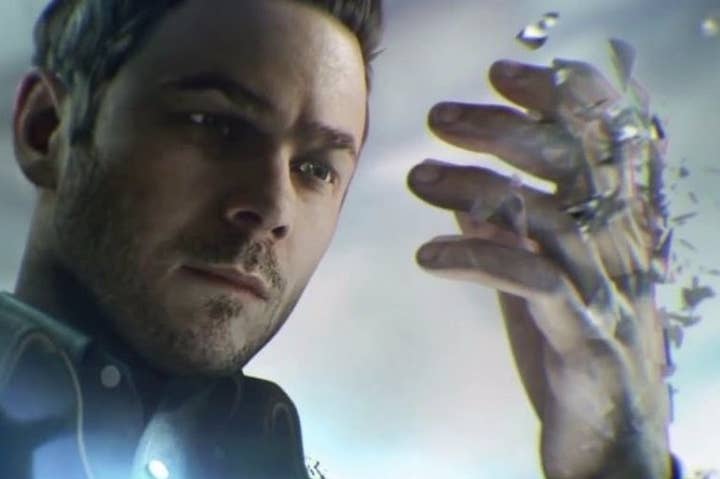Critical Consensus: Remedy's reach exceeds its grasp with Quantum Break
Ambitious Xbox One exclusive isn't short on style, but the critics are divided on how well it comes together
In an age of viral media and ubiquitous social networks, it's rare to encounter a major AAA release surrounded by so much uncertainty. Quantum Break has likely been in full development since 2012, when Remedy Entertainment launched Alan Wake: American Nightmare, and it has been a shining beacon in the Xbox One's line-up since Microsoft unveiled the console a year later. Was Microsoft bankrolling an exclusive answer to Uncharted's slick, story-driven adventure? Was its furtive marriage of live-action TV series and third-person action the result of unrevealed brilliance, or the unfortunate by-product of a now defunct product strategy? Or was it all just a logical evolution of the slick production and metatextual noodling found in all of Remedy's previous games?
Reading through the myriad reviews that are now setting the record straight, the answer may be that Quantum Break is all of these things. Unfortunately for Remedy and Microsoft, there's no consensus on just how capably it delivers on any one.
"Remedy accomplishes something no one has really tried, much less successfully executed on"
Polygon
With a score of 8.5 out of 10, Polygon is among Quantum Break's more ardent admirers, praising Remedy for mostly fulfilling what seemed to be the loftiest of the game's many promises: a marriage of action game and TV series that both works and satisfies.
"The way Quantum Break handles story is, easily, the most interesting, successful thing about it... Remedy accomplishes something no one has really tried, much less successfully executed on: The studio has integrated the game of Quantum Break with a fully live-action episodic component.
"This is no half-measure: Four out of five of Quantum Break's in-game acts are followed by half-hour live-action episodes using the same actors cast within the game proper. Other narrative-heavy games that take the reins from the player for minutes or even hours at a time have often jokingly been criticized with the suggestion that their creators should "go make a movie" - I'm looking at you, Mr. Kojima - but Remedy has actually done it.
"Even more surprisingly ... it's pretty good? There's a question mark there because I'm still surprised to be saying it."
While the player spends the majority of the game controlling a conventional hero character, Jack Joyce, it also allows them to influence the actions of the antagonist, Paul Serene, in a series of playable bookends. Choices made in these sections influence the content of the story told through both the live-action episodes and the remaining game.

"These present an interesting conceit that I've never seen in any choice-driven game," Polygon notes. "You're making decisions as a villain, and are given the option to see the direct consequences of your actions - but the events that unfold after that are impossible to know. Some characters may vanish from the story entirely, or take on new roles or sides depending on these choices. They also managed to humanize Paul in a way that the game otherwise doesn't accomplish, adding a tragic spin to the story."
And it does this with no shortage of style. Indeed, Eurogamer's review - which does not find Quantum Break to be good enough for Recommended or Essential, nor bad enough to be Avoided - reserves most of its praise for the game's splendidly polished surface, particularly the impressive way the game, "shares the look and feel of the TV series."
"Quantum Break is primarily a shooter with little depth or nuance. What it boasts instead is an impeccable sense of style"
Eurogamer
"Quantum Break is primarily a shooter with little depth or nuance. What it boasts instead is an impeccable sense of style... An explosion in a university grounds, say, or a cruiser ship crashing noisily into a bridge; at these points there's a deliciously perverse fetishisation of twisting metal and shattered glass that would have done dear Ballard proud, and a phenomenal visualisation of it all, told in countless particles and streaks of expressive light.
"It's as a spectacle that Quantum Break really triumphs, a showcase of excellence on Remedy's behalf as it creates an experience that's aggressively handsome, delivered with great visual flair. When those firefights break out into noisy showers of sparks, pockets of fractured time and splinters of scenery, Quantum Break shows the magic that can happen when you give a handful of demoscene veterans a Hollywood budget."
All of which sounds promising, but one cannot simply gloss over Eurogamer's comment that, "Quantum Break is primarily a shooter with little depth or nuance." Though other outlets might disagree on the use of the word "primarily" in that context, the criticism that Remedy has prioritised style over substance is relatively common. Indeed, Quantum Break's staunchest critics seem to be those who lacked enthusiasm for its game/TV hybrid elements, leaving its mechanical weaknesses all the more exposed. Giant Bomb, for example, which will settle somewhere towards the bottom of Quantum Break's Metacritic page with its two star review.
"Actually playing Quantum Break means you'll engage in a lot of third-person cover shooting and some ill-conceived platforming," Giant Bomb states, before describing a set of player abilities that are tied to the plot's time manipulation conceit in name alone. "It feels like the developers just came up with a set of abilities and slapped the word 'time' on the front of each one.

"The gun handling in Quantum Break is pretty underwhelming and the powers at your disposal don't feel as cool as they probably should. In some alternate timeline, this game has abilities that work together and chain off of each other, creating a more satisfying feeling of flow in combat. Instead it's simple cooldown management as each of your powers is just about as good as every other one at taking down one or two enemies at a time... Remedy has delivered fantastic action games with exciting shooting components in the past, and it's a real shame that Quantum Break doesn't follow in those footsteps.
"Overall, the gameplay feels like it needs more variety, which makes the TV show side of things frustrating, since it features a car chase and other things that probably would've been more engaging if they were in the video game portion of the product."
"Microsoft and Remedy's experiment with live-action TV in a game is a horrible failure of management and execution"
Ars Technica
And that leads into the single most divisive aspect of Quantum Break, the apparent reason why its review percentages roam from 40 per cent all the way up to 90: the live-action episodes, and not the concept, but the reality. For Wired, they are "well-acted and tightly paced" enough to save Remedy's, "radical concept from total disaster... They look and feel exactly like... well, like a mid-season replacement on the USA Network, if we're being honest. But the action is just intriguing enough that you won't mind being asked to watch a 20-minute cut scene before beginning the next level.
"[Quantum Break] will be remembered for blending game and live-action in a formula that actually kinda worked, not for its gameplay, which feels unambitious, half-baked."
Ars Technica, on the other hand, takes a very different view, lambasting the, "excruciatingly average live-action TV show" for interfering with the "many strong elements" elsewhere. Ultimately, that could just be evidence that one person's Breaking Bad is another's Brady Bunch, but with a package as lavishly and expensively assembled as Quantum Break, it's worth contemplating whether it's a result Remedy and Microsoft will be happy to accept.
"Rather than make room in the live-action show for...character development, that show's director wastes our time with overlong, poorly shot action sequences," Ars Technica states. "Microsoft and Remedy's experiment with live-action TV in a game is a horrible failure of management and execution. It's as if someone let Xzibit into an Xbox conference room so that he could shout, 'Yo dawg, I heard you like Netflix on your Xbox'-and totally missed the point of why and how we consume stories within our favorite games. Press Y to skip."









